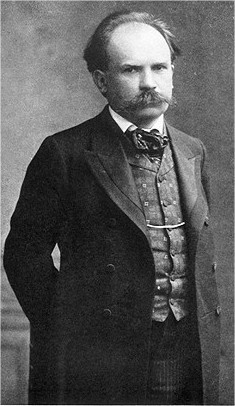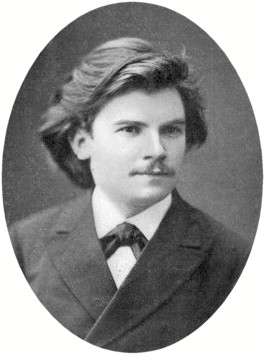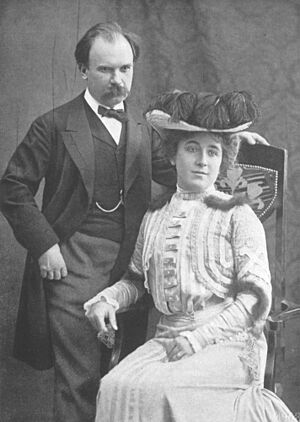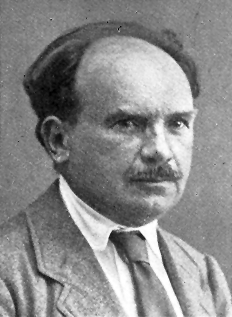Eugen d'Albert facts for kids
Eugen d'Albert (born Eugène d'Albert) was a talented musician born in Scotland in 1864. He became a famous pianist and composer. When he was young, he moved to Germany, where he felt more at home with the music and culture.
Eugen d'Albert studied with the famous composer Franz Liszt. He became well-known for his piano playing. Later, he spent more time composing. He wrote many operas, piano pieces, and orchestral works. His most famous opera is Tiefland, which was first performed in 1903.
He also directed the Hochschule für Musik in Berlin, which is a big music school. He helped shape music education in Germany. D'Albert also edited music by great composers like Beethoven and Bach. He was married several times and became a citizen of different countries. He passed away in 1932.
Contents
Biography
Early life and education
Eugen d'Albert was born in Glasgow, Scotland. His mother was English, and his father, Charles Louis Napoléon d'Albert, was German. His father was a pianist and composer who wrote a lot of dance music. Eugen was born when his father was 55 years old. Because of this, he sometimes felt a bit lonely and misunderstood as a child.
He learned music from his father in Glasgow. When he was 12, in 1876, he won a scholarship. This allowed him to study at the National Training School for Music in London. This school is now known as the Royal College of Music. There, he studied with important teachers like Arthur Sullivan.
By the time he was 14, people noticed his talent. A newspaper called The Times praised him as a very skilled piano player. In 1880, he played Schumann's Piano Concerto and received more praise. He also helped with the music for Sullivan's opera Patience.
For a while, d'Albert didn't think much of his early training in England. He felt he learned nothing there. However, as he got older, he changed his mind. He said that his earlier negative feelings about England had completely disappeared.
Career
In 1881, a conductor named Hans Richter asked d'Albert to play his first piano concerto. It was a big success. That same year, d'Albert won the Mendelssohn Scholarship. This scholarship allowed him to study in Vienna, Austria. There, he met famous musicians like Johannes Brahms and Franz Liszt.
D'Albert loved German culture and music, especially after hearing Tristan und Isolde, a famous opera. He changed his first name from Eugène to Eugen. Then, he moved to Germany and became a student of the elderly Franz Liszt in Weimar.
In Germany and Austria, d'Albert became a very successful concert pianist. Liszt even called him "the second Tausig", comparing him to another great pianist. D'Albert played his own piano concerto with the Vienna Philharmonic Orchestra in 1882. He was the youngest pianist to perform with them at that time. He toured a lot, even in the United States. People said his piano skills were amazing. He was especially good at playing pieces by Beethoven and J. S. Bach.
Over time, d'Albert spent more and more time composing music. He played fewer concerts. In 1907, he became the director of the Hochschule für Musik in Berlin. This role gave him a lot of influence on music education in Germany. He also worked as a music director (called a Kapellmeister) for the Court of Weimar.
D'Albert wrote many different kinds of music. He composed a lot of successful piano and chamber music. He also wrote 21 operas, each in a different style. Most of his operas were first performed in Germany. His first opera, Der Rubin (1893), was an oriental fantasy. Die Abreise (1898) was a short comedy that made him famous as an opera composer in Germany.
His most successful opera was Tiefland, which premiered in Prague in 1903. This opera was performed in many opera houses around the world. It is still played in Germany and Austria today. Another successful work was a funny opera called Flauto solo (1905). D'Albert also wrote successful orchestral pieces. These included his cello concerto (1899), a symphony, and two piano concertos. He was very good at writing music that fit the drama of a story.
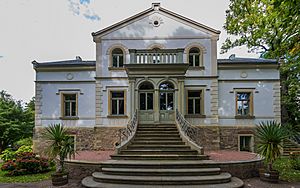
Personal life and death
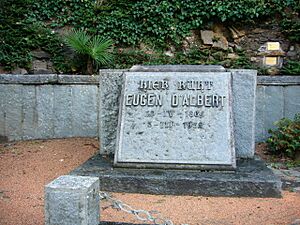
Eugen d'Albert had many friends who were also famous musicians, like Richard Strauss. He was married six times and had eight children. One of his wives was the Venezuelan pianist and composer Teresa Carreño. His other wives included the singer Hermine Finck and actress Ida Fulda.
In 1914, d'Albert moved to Zurich, Switzerland, and became a Swiss citizen. He passed away in 1932 in Riga, Latvia, at the age of 67. He was buried in a cemetery in Morcote, Switzerland, overlooking Lake Lugano.
Works
Operas
Orchestral works
Keyboard
|
Chamber works
Vocal music
|
Recordings
Eugen d'Albert didn't make a huge number of recordings as a pianist. But the ones he did make show his skill in playing different kinds of music. He recorded some of his own pieces, like his Scherzo and Suite.
He also recorded several pieces by Beethoven, including two of his Piano Sonatas. He recorded some works by Chopin, like his études and waltzes. Interestingly, his teacher Liszt isn't strongly featured in his recordings, though he did record one piece by Liszt. Other composers like Brahms, Mozart, Schubert, and Weber are also in his recordings.
In recent years, more of d'Albert's music as a composer has been recorded. Some modern recordings include:
- Piano Concertos No. 1 in B minor, Op. 2, and No. 2 in E major, Op. 12
- Piers Lane/BBC Scottish Symphony Orchestra/Alun Francis
- Joseph Banowetz/ Moscow Symphony Orchestra/ Dmitry Yablonsky
- String Quartets No. 1 in A minor, Op. 7, and No. 2 in E-flat, Op. 11
- Sarastro Quartet
- Piano Sonata in F-sharp minor, Op. 10; Klavierstücke, Op. 16; Heft 1 and Heft 2, Serenata and Capriolen Fünf schlichte Klavierstücke
- Piers Lane
- Tiefland
- Éva Marton; René Kollo; Bernd Weikl; Kurt Moll; Münchner Rundfunkorchester/Marek Janowski
- Margherita Kenney; Waldemar Kmentt; Otto Wiener; Vienna Symphony Orchestra/ F. Charles Adler
- Lisa Gasteen; Johan Botha; Falk Struckmann; Vienna Radio Symphony Orchestra/ Bertrand de Billy
- Die Abreise
- Hermann Prey; Edda Moser; Peter Schreier; Philharmonia Hungarica/János Kulka
See also
 In Spanish: Eugen d'Albert para niños
In Spanish: Eugen d'Albert para niños
 | Chris Smalls |
 | Fred Hampton |
 | Ralph Abernathy |


